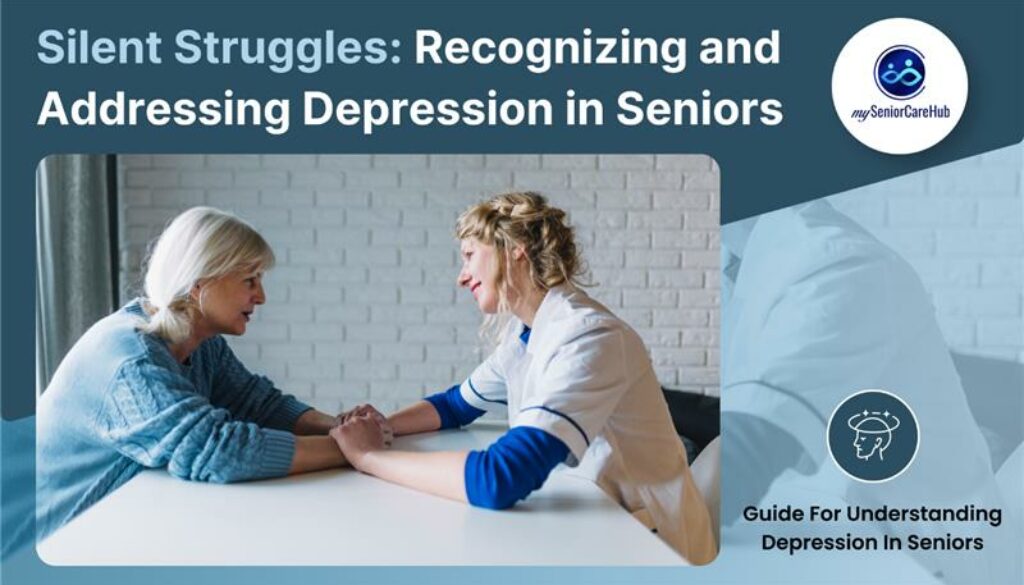Supporting Seniors Through Depression with Medical and Emotional Care
Mental Health in Old Age – Medical and Emotional Care
Imagine this: Your once lively, story-telling grandmother now spends most of her day staring out of the window. She insists she’s just “tired,” but deep down, you sense something is wrong. Is it just old age, or is she silently battling something deeper?
Seniors suffering from depression are frequently confused with “normal aging.” Seniors may be more reluctant to discuss their feelings or even acknowledge that they are depressed than younger adults. Rather, their difficulties manifest in more subdued ways, such as withdrawal from discussions, diminished interest in pastimes, inexplicable pains, or changes in appetite. Because of this, many seniors suffer in silence, believing their sadness is an unavoidable part of growing old. The reality is that depression is not a typical aspect of growing older. It is a medical condition that can be treated, and it should.
This article explains how to identify the subtle symptoms, offer emotional support, and look into medical options to help seniors deal with depression in a dignified and caring manner.
Doctor’s Perspective: Why Depression in Seniors Often Goes Unnoticed – Medical and Emotional Care
Senior depression is because of a neurochemical imbalance in the brain. Unlike younger adults, who usually experience depressive symptoms like sadness or hopelessness, older adults frequently have somatic symptoms like:
- Chronic fatigue that doesn’t improve with rest
- Unexplained pain—persistent headaches, joint pain, or gastrointestinal discomfort
- Sleep disturbances—insomnia or excessive sleep
- Changes in appetite leading to malnutrition or weight gain
- Cognitive impairment—difficulty concentrating, memory lapses, or slowed thinking
The Role of Neurochemicals – Medical and Emotional Care
Our brain produces chemicals called neurotransmitters, which play an important role in regulating our mood. Senior depression is frequently associated with neurotransmitter dysregulation, specifically:
- Serotonin: Deficiency contributes to mood instability, sleep disturbances, and irritability.
- Dopamine: Reduced levels affect motivation, pleasure, and energy levels, often leading to apathy.
- Norepinephrine: Low levels result in fatigue, reduced alertness, and poor stress response.
Aging also diminishes the brain’s ability to adapt and recover from stress. Additionally, chronic inflammation and vascular changes in the brain are now recognized as key contributors to depression in older adults.
Medical Conditions That Mimic Depression
Senior depression is frequently confused with other illnesses, including:
- Hypothyroidism: Low thyroid function can mimic depression by causing fatigue and cognitive slowing.
- Vitamin B12 & D Deficiency: Common in elderly individuals, leading to mood disturbances and brain fog.
- Cardiovascular Diseases: Because these conditions reduce blood flow to the brain, stroke, heart disease, and hypertension are closely associated with late-life depression.
- Neurodegenerative Disorders: Alzheimer’s and Parkinson’s disease frequently present with depressive symptoms in their early stages.
Why Many Cases Go Untreated – Medical and Emotional Care
Depression in seniors is often overlooked because its symptoms—fatigue, memory issues, and appetite changes—are mistaken for normal aging. Many seniors avoid discussing their emotions due to stigma or fear of medication dependence, while healthcare providers tend to focus more on physical health. As a result, depression remains undiagnosed and untreated, impacting overall well-being.
Diagnosing Depression in Seniors
Identifying depression in seniors requires a comprehensive medical evaluation, as symptoms often overlap with other age-related conditions. Physicians use standardized screening tools like the Geriatric Depression Scale (GDS) or Patient Health Questionnaire-9 to assess mood, energy levels, and cognitive function. Blood tests may be conducted to rule out underlying causes such as thyroid dysfunction, vitamin deficiencies, or chronic inflammation, which can mimic depressive symptoms. Additionally, brain imaging (MRI or CT scans) may be recommended if cognitive decline or neurodegenerative disorders are suspected. A thorough medical history, including medication review, is also crucial since certain drugs—like beta-blockers, corticosteroids, and sedatives—can contribute to depressive symptoms. Early diagnosis ensures timely intervention, preventing further decline in mental and physical health.
How Can Depression in Seniors Be Treated? Medical and Emotional Care
- Medical Support
A doctor may recommend treatments based on an individual’s health and symptoms. Options include medications, therapy, or brain stimulation techniques. Since older adults metabolize medications differently, doctors carefully adjust doses to ensure safety. Always consult a healthcare provider before starting any treatment.
- Therapy & Emotional Support
Cognitive-behavioural therapy (CBT) helps reframe negative thoughts.
Counselling & support groups provide a safe space to share feelings.
Family involvement is essential; open conversations reduce stigma and encourage people to seek help.
- Lifestyle Changes for Mental Wellness
Daily sunlight & movement: A simple walk outside can boost mood.
Brain-healthy foods: A balanced diet with omega-3s and antioxidants supports mental well-being.
Hobbies & Social Interaction: Engaging in activities like music, gardening, or community groups fosters joy and connection.

Bridging the Gap: The Role of Caregivers in Mental Well-Being
When seniors stop participating in conversations, skip meals, or lose interest in once-loved activities, caregivers and family members are frequently the first to notice subtle changes in their behaviour. However, being aware of these indicators is only the first step; what really helps is establishing a secure environment for candid discussion.
Instead of asking, “Are you feeling depressed?”—which might feel overwhelming—gentler questions like, “I’ve noticed you haven’t been yourself lately. Small, thoughtful gestures like organizing social outings, incorporating light exercise, or simply being present can have a significant impact on emotional well-being. Mental health care is extremely personal and goes beyond simple medical treatment.
Aging with Joy, Not in Silence
Growing older should be about embracing memories, cherishing relationships, and continuing to find joy not silently battling depression. A simple conversation, a walk in the sun, or a check-in from a loved one can make a huge difference. When seniors are supported emotionally and medically, they don’t just survive—they thrive.
How mySeniorCareHub Brings Care Closer
Senior depression is largely caused by social isolation and loneliness, which are addressed by mySeniorCareHub: Track360. With easy-to-use communication tools, regular check-ins, and real-time monitoring, the app ensures that seniors remain connected with their caregivers and loved ones. By fostering companionship and emotional engagement, mySeniorCareHub provides not just support but a sense of belonging and security for aging individuals.
Because mental health is about feeling understood, supported, and seen, not just about getting treatment.








